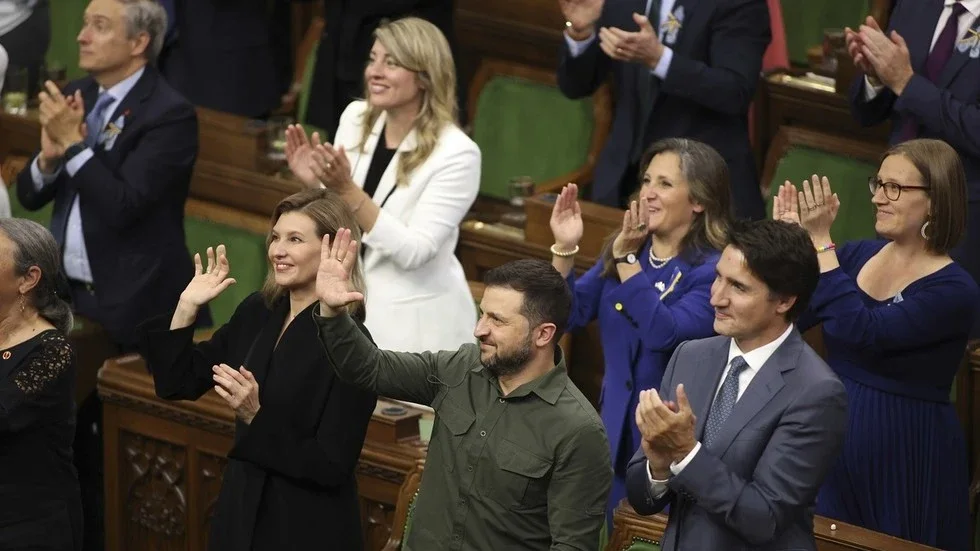

Canadian Prime Minister Justin Trudeau (right) faces a monumental public relations disaster after inviting Nazi war criminal Yoroslav Hunka to parliament
Growing row between Canada and India with two world democracies trading jabs and locking horns over the issues of political rights and freedoms, as well as the sovereignty and territorial integrity is followed by a mirror scandal that has further aggravated the already conflicting relations between Canada and Russia.
The situation is quite unique in itself as the two scandals have many similarities and develop according to a similar scenario. As a result, Canada is simultaneously waging a diplomatic and information war on two fronts. One front is anti-Indian, another is anti-Russian.
When it comes to India the major troublemakers who are rocking the boat are Sikh separatists who managed to legalize themselves overseas and to pose as a respectable politicians and public figures while looking for a chance to stab India in the back.
The same way driven by same malignant instincts the all- powerful Ukrainian diaspora of Canada, which was formed after the Second World War, is acting against Russia.
The man at the center of the Russian-Canadian scandal was a 98-year-old “Ukrainian-Canadian veteran of World War II” Yaroslav Hunka who was a guest of honor at Canadian Parliament meeting held last Friday which was attended by Ukrainian President Zelensky, who visited Ottawa on his way from Washington.
Yaroslav Hunka was personally introduced by the Speaker of the House of Commons Anthony Rota, who called him a hero of the Second World War who fought for Ukrainian independence against the Russians.
The scandal broke out after media leaks of Hunka’s dark past. As it turned out, he fought “against the Russians” as soldier of the Ukrainian 14th Grenadier Volunteer Division of the SS troops “Galicia”, which participated in the massacres of Jews, Poles, Belarusians, Slovaks.
The SS division “Galicia” was formed from residents of Western Ukraine in 1943 and fought against the Red Army together with the troops of Nazi Germany. In July 1944, the division was almost completely destroyed in the Battle of Brody, and then reformed and used in Austria, Slovakia and Yugoslavia. In April 1945, it was withdrawn from the SS, renamed the 1st Ukrainian Division and incorporated into the Ukrainian National Army. In May 1945, its soldiers surrendered to the troops of Great Britain and the United States.
After that, many of them managed to freely go overseas and start a new life there, without fear of criminal prosecution for their past.
The information that Yaroslav Hunka not only fought with the Soviet army, but also participated in the massacres of Jews and Poles, led to a political upheaval in Ottawa. Those who applauded Yaroslav Hunka rushed to condemn his invitation to the House of Commons.
The resignation of the speaker Rota became inevitable after government representatives met faction leaders, with all parties unanimously speaking in favor of his departure.
However, the version that it was a mistake of a single person who invites Hunka without checking his background is not subscribed by the Russian Ambassador to Ottawa Oleg Stepanov. “They threw Rota onto the rails. But, I think, the matter will not end here. The conservative opposition will try to press the prime minister further, earning political points,” — the head of the Russian diplomatic mission said. According to Oleg Stepanov, the issue of the Nazi legacy in Canada remains unresolved. “This story may have a sequel. Although, of course, Trudeau and the company will make every effort to get themselves immune to a scandal,” the Russian diplomat believes.
The unexpected scandal, triggered by the visit of Vladimir Zelensky to Ottawa and a parliamentary performance in his honour, has shed light on the phenomenon of modern Canada, which boasts to be a member of G7 and calls itself one of the world’s leading democracies. However, a democratic multiparty Canada de-facto has turned into a comfortable haven for international culprits of all stripes.
One can live in this harbor for decades without fear of criminal prosecution and extradition, which has never happened. It should be added that some of the Sikh emigrants who settled in Canada are not abandoning the idea to create an independent state of Khalistan, and have already set a task to make Khalistan a reality by 2025.
This is what modern Canada looks like today – the country of the famous red maple and maple syrup made from its leaves, which has imperceptibly become the country of the horseradish leaf.
(Sergei Strokan is a veteran journalist, writer and columnist of the Kommersant publishing house based in Moscow. The views expressed are personal and exclusive to India Narrative)
Also Read: Not just Khalistanis, Canada refuses to deport assassin of Sheikh Mujib of Bangladesh
New Zealand's Deputy Prime Minister and Foreign Minister Winston Peters has arrived Kathmandu on his…
The Indian Army and the Mongolian Armed Forces will commence the 17th edition of their…
Pandi Ram Mandavi, a renowned artist from Bastar, Chhattisgarh, was conferred the Padma Shri award…
Taiwan's Mainland Affairs Council (MAC) criticised China on Wednesday for organising two summits for Taiwanese…
The East Turkistan Government in Exile (ETGE) vehemently denounces Mr. Francesco Frangialli, the Honorary Secretary-General…
Chairman John Moolenaar and Ranking Member Raja Krishnamoorthi of the House Select Committee on the…